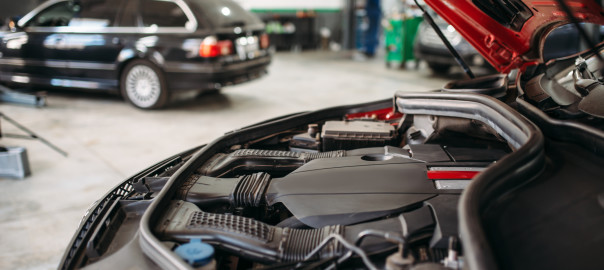Vehicles are highly complicated pieces of machinery – and just as there’s many moving parts that make a vehicle properly operate, there’s many possible causes of vehicle failure that might cause a ‘check engine’ light to illuminate on your dashboard. In this blog entry, the Chicago roadside assistance service experts here at Towing Chicago will detail some of the top reasons that check engine lights are activated in modern vehicles.
What are Check Engine Lights?
Check engine lights are parts of your car’s onboard diagnostic system. Onboard diagnostic systems let you know if an aspect of your car’s ignition, fue, emissions, or exhaust system is malfunctioning. This can range from simple issues like loose gas caps to serious issues like battery or catalytic converter issues. Check engine lights illuminate when there’s an issue, with indication of the specifics. Modern automobile computers regularly and closely monitor vehicle performance, analyzing engine speed, ignition timing, and fuel levels to precisely alert drivers to maintenance needs. Check engine lights tell you that an aspect of your vehicle is not operating according to its proper set parameters.
Causes of Check Engine Light Illumination
Loose Gas Caps
Loose gas caps will prevent fuel systems from holding the proper amount of tank pressure. Working fuel systems operate with immense pressure, and need a fully sealed gas cap to maintain this pressure. This is one of the most common reasons that check engine lights illuminate.
Catalytic Converter Problems
Catalytic converters reduce air pollution by transforming harmful chemicals in car exhaust gas to less harmful substances before they are released into the air. Issues with catalytic converters can cause raw fuel to enter into your exhaust system, which can cause cascading issues with other parts like oxygen sensors and spark plugs.
Oxygen Sensor Issues
Oxygen sensors measure how much oxygen is in your vehicle’s exhaust – and repairing it usually costs between one and two hundred dollars.
Spark Plug Issues
Spark plugs help to ignite fuel inside your car’s cylinders to help provide power to your vehicle. When spark plugs experience issues, they cause a wide range of starting and driving issues, impeding speed.
Engine Air Filters
Clogged or dirty engine air filters cause damage by allowing an excess of air into your car’s combustion chamber.
Ignition Coil Issues
Ignition coils transform the battery’s low voltage into many volts of electricity to help activate the spark plugs and cause combustion in your engine’s cylinders. Broken ignition coils is another common reason for check engine lights to illuminate.
Evaporation Control System Issues
Evaporation control systems store fuel vapors before they can be burned off during combustion. Issues with evaporation control systems cause these vapors to escape through purge valves or leaks.
Check engine lights can illuminate in both flashing and solid variations. Flashing check engine lights indicate a very serious issue that can rapidly damage your car’s engine, and cause a great deal of damage or risk. If your check engine light is flashing, pull safely to the side of the road as soon as possible and contact a trusted roadside assistance service. A solid check engine light will indicate a subtler – and potentially more complex issue (that requires a close inspection.) If your check engine light is solid, bring your car to a mechanic to get a professional opinion or necessary repair service.

